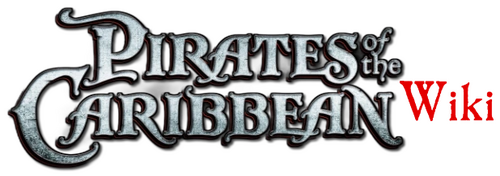"The Medallion Calls" is a musical theme credited to Klaus Badelt (with Hans Zimmer's assistance) for Pirates of the Caribbean: The Curse of the Black Pearl. It appears as track two on the film's soundtrack, at 1:52 in length.
Track Description[]
The track begins as a segue from "Fog Bound", continuing the film's love theme for Will Turner and Elizabeth Swann. This gives way to Jack Sparrow's introductory theme (0:16), which is repeated throughout the film series as the character's leitmotif. It dips into a mournful tune (0:57) before rising heroically (1:06) and ending the track with a waltzing melody.
Assembly[]
The score cues that make up the album track are "1m05 Smitten Will" and "1m06 Captain Jack Sparrow".
Use[]
In the movies[]
Despite the name, "The Medallion Calls" is first heard in Pirates of the Caribbean: The Curse of the Black Pearl when Elizabeth Swann and Will Turner exchange farewells before leaving Governor Weatherby Swann's mansion, then leads into Captain Jack Sparrow's arrival to Port Royal as his introduction theme. Standing proudly atop the yardarm of the Jolly Mon, Captain Jack Sparrow surveyed the town of Port Royal, looking every inch a pirate captain. Looking down, Jack jumped down to the deck overrun with water, revealing his ship is not an imposing three-master, but just a small fishing dory with a single sail. As the boat started sinking, Jack searched through the deck's clutter, found a bucket, and began to bail it. Jack comes across a rocky outcropping from which he saw three skeletons, still clad in buccaneer rags, hanging from gallows. A fourth, unoccupied, noose bearing the "Pirates Ye Be Warned" sign. Pausing, Jack Sparrow took off his tricornered hat and placed it above his heart—a moment of exaggerated respect for the doomed pirates as he sailed by them. The harbor of Port Royal was crowded with boats, fishing vessels of all sizes, as the Jolly Mon arrived, now almost completely underwater. Jack reached the dock just as the tip of the boat completely disappeared beneath, where only the mast was visible above water. Stepping onto the dock, he came face-to-face with a very confused harbormaster, telling Jack, "Hold up there, you! It's a shilling to tie up your boat at the dock." Jack glanced at him quizzically and then looked over his shoulder at the fully submerged Jolly Mon.
Like The Curse of the Black Pearl, the opening theme is played when Jack is reintroduced in Dead Man's Chest and At World's End. In Dead Man's Chest, it is played after the escape from the Turkish Prison, when Jack sits up from a coffin, rummages for his tricorne hat, pulled up a skeletal leg of a dead human body and used the bone to paddle the coffin as a makeshift oar to row toward the Black Pearl. In At World's End, it is used in a more dramatic form with the backing of a choir, played when the Black Pearl rose majestically over the sandy dunes of Davy Jones' Locker, with Captain Jack Sparrow proudly standing at the yardarm. Jack's crew squinted and took in the sight as thousands of crabs carried the ship closer to them, finally scuttling past to bring it into the water. This version appears at the end of "Singapore" on the film's official soundtrack.
While absent in On Stranger Tides, the theme is in Dead Men Tell No Tales. It is first heard when the Black Pearl is released from its bottled prison, and later when Jack sails the Pearl to his "beloved horison."
In other Pirates media[]
An arrangement of "The Medallion Calls" is heard in the 2006 revamp of Walt Disney's Pirates of the Caribbean at Disneyland and the Magic Kingdom, playing over a battle between the Wicked Wench and a Spanish fortress. Captain Barbossa leads the assault from the deck of the pirate galleon, giving orders to his crew as cannonballs screech towards the fort in the ongoing battle.
"The Medallion Calls" or a variation of the theme was used for the main title for several video games, including Pirates of the Caribbean: At World's End and LEGO Pirates of the Caribbean: The Video Game.
